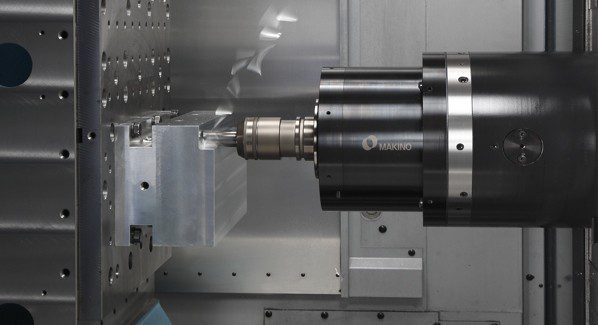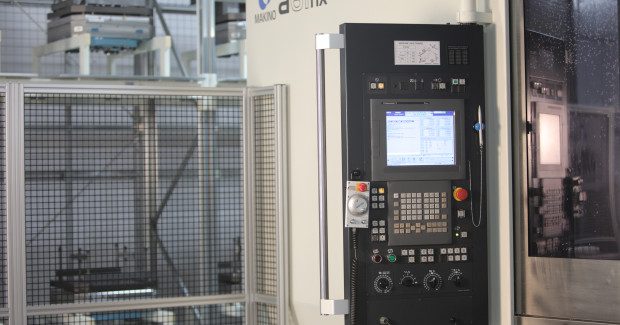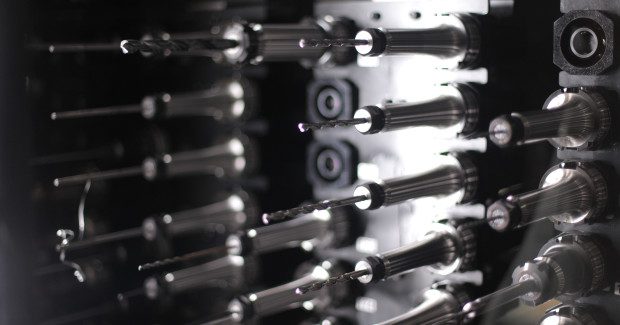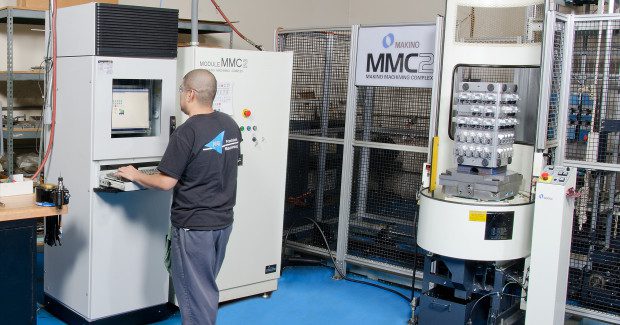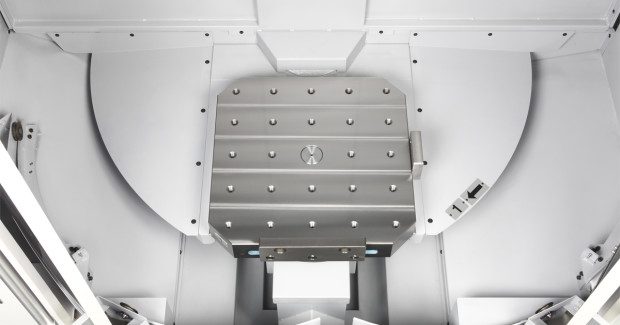The Roadmap to 24/7 Machining
To run a manufacturing facility around the clock requires planning, the right equipment, efficient processes and the dedication to implement each step for repeatable processes. With these elements in place, a company can work toward its goal of producing perfect parts on time, no matter the customer requirement.
Posted: June 2, 2015
Forecasting customer demand is never easy, but many successful manufacturers are prepared to handle any requirements that come their way, thanks to investment in repeatable, scalable and cost-effective flexible manufacturing systems (FMS) to accomplish 24/7 machining. In developing these systems, manufacturers are capable of achieving up to 95 percent spindle utilization while improving flexibility, quality and responsiveness.
The roadmap to 24/7 machining is composed of five fundamental technology and process elements:
- Robust machining centers
- Pallet interchangeability
- Dynamic scheduling
- Data monitoring and reporting
- Standardized tooling and fixturing
Many manufacturers may have already addressed one or several of these fundamental elements; however, when implemented together simultaneously, these elements create repeatable, scalable, flexible and cost-effective machining processes.
ROBUST MACHINING CENTERS
Establishing a 24/7 machining cell begins with the selection of a reliable machine-tool supplier that offers exceptionally rugged equipment and unrelenting support. Productivity, quality and reliability should be fundamental to the design and manufacture of a machine tool. These attributes can be identified through several key features, such as extra-rigid base castings and sophisticated thermal management of key machine components. Simplified mechanical design elements are oftentimes the most reliable and require the least amount of maintenance, which is why one-piece way covers have been a long-standing feature in the most advanced horizontal machining centers.
An ideal machine supplier should also offer single-source planning, design, engineering and implementation of an automated material-handling system to accompany its machining platforms. The automated system should be highly flexible, requiring little operator intervention, and easily scalable to keep up with future capacity demands. Critical to an automated system is the cell controller, which should provide dynamic scheduling capabilities and smart monitoring functions to ensure the highest degree of unattended reliability.
PALLET INTERCHANGEABILITY
One of the most critical attributes of the flexibility of a 24/7 machining cell is the interchangeability of pallets between varying machine platforms. This capability enables companies to maximize the unique benefits and efficiencies of each machine based on the required machining processes of each part. An example of this is having identically matched quality standards designed into the pallets to allow for the seamless transfer of pallets between different machining platforms, such as a 5-axis vertical machining center and a 4-axis horizontal machining center in a 400 mm pallet cell. Pallet interchangeability not only improves the overall flexibility of a 24/7 machining cell, but it also allows for dynamic scheduling and maximum process efficiency through proper balancing of both 4- and 5-axis applications.
DYNAMIC SCHEDULING
Production demands over the life cycle of a contract can be unpredictable, leading to quick shifts in product mix or volume. Automated 24/7 machining systems with dynamic scheduling capabilities provide the agility and flexibility to respond immediately to changing production requirements with true pull demand. With these capabilities, manufacturers can avoid more frequent setups, increased labor demands and extended lead times, which ultimately have a negative impact on productivity, profitability and competitiveness.
The material handling system’s cell control software must be capable of monitoring and controlling a wide variety of parts and production requirements within the automated cell. The software should allow for more flexible management and scheduling to meet the changing demands of customers’ production orders. An ideal cell controller should also connect and coordinate tool-data information between a company’s tooling department, operators and machinery, facilitating instantaneous transfer and storage of all tool data.
DATA MONITORING AND REPORTING
Data monitoring and reporting are key features to a 24/7 machining cell that provides manufacturers with greater visibility into workflow efficiency and tool management. Within the cell controller, operators should be able to oversee production data, tool data, production results, alarm history and machine utilization. For instance, if a load imbalance exists within the cell based on widely varied runtimes, operators and managers can more easily and quickly identify the bottleneck and adjust production schedules to obtain the greatest efficiency. Through operator experiences and automated reports, companies can also focus on nurturing a shop culture that is in continuous pursuit of efficiency improvements.
STANDARDIZED TOOLING AND FIXTURING
The last stage of implementing a 24/7 machining system involves standardization of fixtures and tooling in order to eliminate interruptions to production and machine utilization. A simple means for accomplishing standardization of tooling is to establish a set list of tools that can be applied to all programmed machine processes. If the machines within the FMS are equipped with identical tool magazines, it can help ensure that any part can be produced on any machine at any time. By investing in machines with expansive tool magazines, manufacturers can load redundant tooling for uninterrupted, unmanned machining once wear limits on the tools have been met. Companies with offline tool-management departments can also maintain strict requirements for tooling characteristics via RFID chips, run-out monitoring, tool balancing, Cpk (process capability index) calculations, and standardized operating and tool setup parameters.
A setup solution that successfully engineers standardized tombstones, clamps and fixtures can be a key component to a company’s pull-demand production requirements, ensuring that a customer can order any part at a moment’s notice with guaranteed results. Setup methods need to not only confirm the repeatability of the machining process but also provide for flexibility and interchangeability. To achieve this level of standardization, some companies custom design their tombstones, clamps and fixtures, or purchase only from pre-approved suppliers to ensure repeatability.
THE GOAL OF 24/7
To run a manufacturing facility around the clock requires planning, the right equipment, efficient processes and the dedication to implement each step for repeatable processes. With these elements in place, a company can work toward its goal of producing perfect parts on time, no matter the customer requirement.





